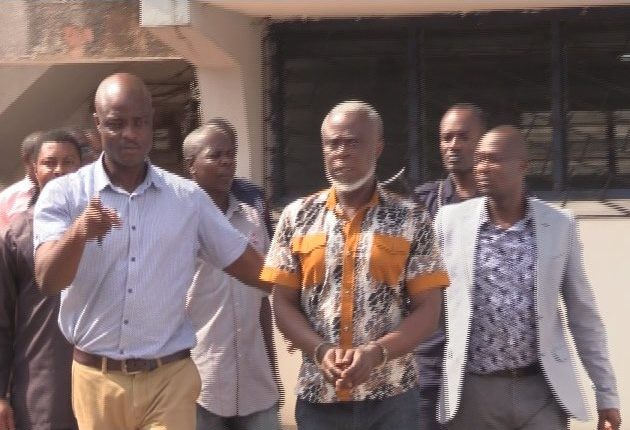No jury forces adjournment of ‘coup plotters’ trial
The Accra High Court was forced to adjourn the trial of suspected coup plotters because it is yet to find a jury.
The court registry informed the court that it has not received any response from persons selected to serve as jurors.
Legal resources website, theconversations.com explains that Ghanaian juries are composed of seven individuals randomly selected from a list composed mainly, if not exclusively, of civil servants.
Their responsibility is to decide, based on evidence presented in court, whether a defendant is guilty of the offence for which they have been charged. They are not involved in sentencing.
In the absence of a jury, the court adjourned the case to November 20.
Background
The Accra High Court hopes that members of the jury would be ready to be empaneled to hear the case against the 10 persons charged with plotting a coup.
By November, it would be one year since high-ranking police officer ACP Benjamin Agodzor was charged with with abetment to treason felony.
A medical doctor, Dr. Frederick Yao Mac Palm, has been accused of being the plot’s mastermind.

The eight other accused persons are Colonel Samuel Kodzo Gameli, Donya Kafui, Bright Alan Debrah Ofosu, Johannes Zikpi, Corporal Seidu Abubakar, Lance Corporal Ali Solomon and Corporal Slyvester Akanpewon.
The accused persons have been slapped with six separate charges including treason felony contrary to section 23 (1) and 182 (b) of the criminal and other offences Act, 1960.
Dr Mac-Palm, Dornyor Kafui, Allan Debrah Ofosu, Dekuwine, Abubakar, L/Cpl Akanpewon and Zikpi are on charges of conspiracy to commit treason felony and treason felony.
Dr Mac-Palm and Kafui have been separately charged with conspiracy to possess explosives and ammunition without lawful excuse and possession of explosives and ammunition without lawful excuse.
Col Gameli and ACP Dr Agordzo have been charged with abetment to treason felony. Charges, they have all pleaded not guilty to.
The court also directed the prosecution team led by Senior State Attorney, Hilda Craig to ensure all the lawyers are served with the disclosure documents.
But the trial is yet to start as a jury is yet to be composed, raising questions about Ghana’s jury system.
The pros and cons of jury system
An article published on theconversations.com on Ghana’s jury system evaluates the pros and cons of the system.
Ghana is one of only a handful of African countries that still use juries.
A key argument in support of the jury system is that it is a valued form of citizen participation in democracies. Supporters argue that juries minimise state oppression by having an unbiased group of one’s peers, instead of a judge, decide the fate of an accused person.
Unfortunately, the jury system in Ghana faces serious challenges. Inefficiency, infringement of human rights and wasteful use of resources results in a bad deal for everyone – the accused, the victim, the courts and society.
There are a number of reasons why the jury system doesn’t work well in Ghana.
The main one is the alarming frequency with which criminal cases are adjourned due to the absence of one or more jury members. This significantly delays the trial process, often while the accused is on remand.
Ghana has provision for a fine or imprisonment to be applied to jury members who fail to attend court without a “reasonable excuse”. But this is rarely, if ever, applied.
Where non-attendance is persistent, as it often is, an absent juror can either be replaced or the entire jury discharged. In either case the law requires the trial to commence afresh, no matter how far along it has progressed. This obviously causes significant inconvenience for all involved. It also has implications for the right to a fair trial and the right to trial within a reasonable time as guaranteed by Ghana’s constitution.
There are also problems with restrictions on who can serve on a jury.
In Ghana, the Criminal Procedure Code prevents a significant number of individuals from serving on a jury, mainly professionals and high-ranking civil servants. This effectively reduces the pool of potential jurors who are capable of understanding the gravity and nature of criminal court proceedings. This is worrying for a country with a 40% literacy rate in rural areas. The literacy rate in urban areas is higher at 70% but still poses a problem.
The current law also bars those below the age of 25 and those above the age of 60 from being jurors. This too unnecessarily excludes a useful segment of society from the jury pool.
In addition, jury selection is complicated by the fact that outside Ghana’s large cities – Accra, Kumasi and Sekondi-Takoradi – the country is made up of many small villages and towns. The comparatively small local populations, in conjunction with the small pool of eligible jurors, means that those selected often reside or work in the same vicinity as the defendant. This heightens the chance that a juror will either know, or know someone who knows, the defendant. This may undermine impartiality.



